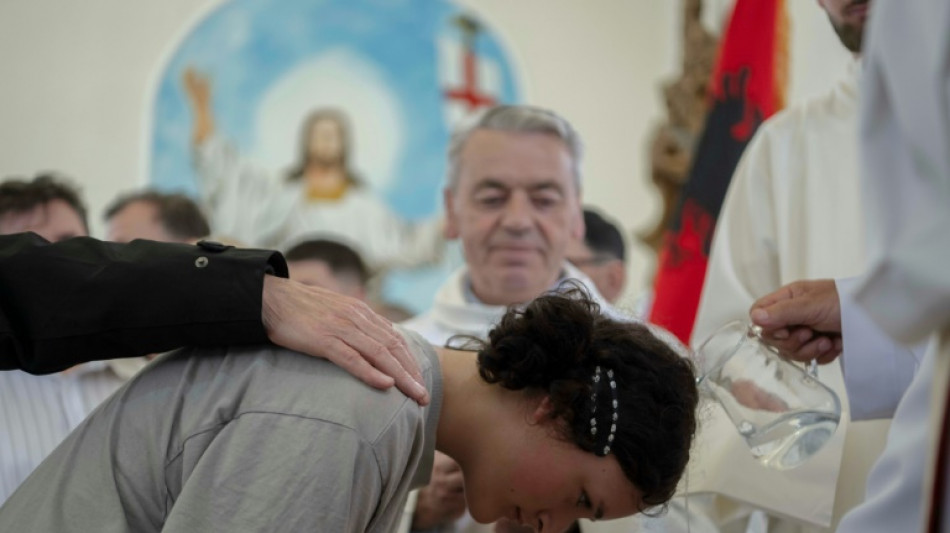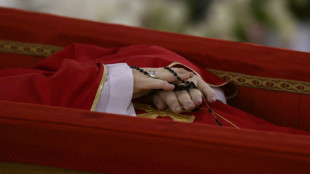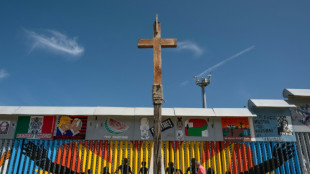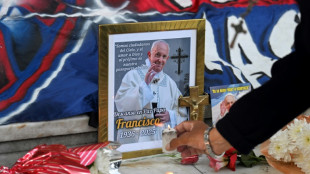

Kosovo's 'hidden Catholics' baptised as Pope Francis mourned
Around the time the Vatican announced the death of Pope Francis, music floated out from a church in a Kosovo valley where dozens of Muslims were participating in an unusual ceremony: they were converting to Catholicism.
Such ceremonies are becoming less rare in Muslim-majority Kosovo, where some so-called "hidden-Catholics" or "Laramans" (a term meaning many-faceted in Albanian) are choosing to return openly to the faith of their ancestors, converted centuries ago under Ottoman rule.
"I baptise you in the name of the Father, the Son and the Holy Spirit. Amen," intoned the priest, Father Fran Kolaj as he welcomed 38 new Catholics -- aged from seven to 55 -- anointing their foreheads with holy oil. "Welcome to the Church!"
"I've always felt that I belonged to the Catholic faith," said Lirije Gashi, a 24-year-old nurse who had just undergone the ceremony. "This ceremony is the culmination of my spiritual journey."
According to official statistics, 93.5 percent of Kosovo's 1.7 million population are Muslim. Less than two percent identify as Catholic.
- Francis 'would have done the same' -
Although no official figures exist, Kolaj claims that more than 3,000 people have converted to Catholicism in his Church of Saint Abraham overlooking the Llapushnik Valley since Kosovo's independence from Serbia in 2008.
Before being accepted into the Catholic faith, new believers prepare by learning prayers, rites and the fundamental principles of Christianity.
"They join the Church of their own free will. It's 100 percent their choice," the priest said.
On Monday, the church was already packed with around 500 worshippers when the solemn news broke of the pope's death. But the decision was made to continue with the ceremony.
"He would have done the same," said Dardan Duka, a security guard.
- Muslim by day, Catholic by night -
According to historian Shkelzen Gashi, the Islamisation of Albanians across a span of five centuries of Ottoman rule was often carried out under pressure: land taxes applied only to Christians, and the community faced repression by the authorities.
"In reality, the main motivation for converting to Islam was material," he said. "It was a question of economic interests because taxes were lower... career opportunities and social status."
But the centuries did not entirely erase their Christian roots. In the privacy of their homes, the Catholic faith continued to live on, passed down through the generations.
It only began to emerge publicly in a new era of openness following Kosovo's independence.
"My ancestors practised Islam by day and Catholicism by night," said Muse Musa, a 50-year-old retiree whose 28 family members were also baptised.
"They celebrated Ramadan, but their hearts were Catholic. Today, everything is different."
Blerim Metaj, 35, said: "We're returning to our roots. To what we originally were."
These conversions have not provoked any hostile reaction from the Muslim community in Kosovo, a country that prides itself on religious tolerance and where ethnicity takes precedence over creed.
A local proverb sums it up well: "The religion of Albanians is Albanianism."
But, in the eyes of historian Shkelzen Gashi, that balance is fragile.
"When you see how the political parties clash here, with animosity, slander and threats, it's not out of the question that religious competition could go down the same path."
T.Delacroix--PP






